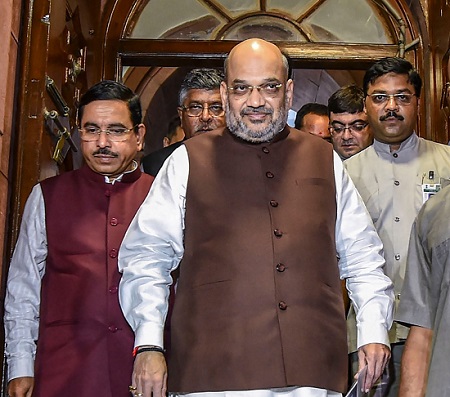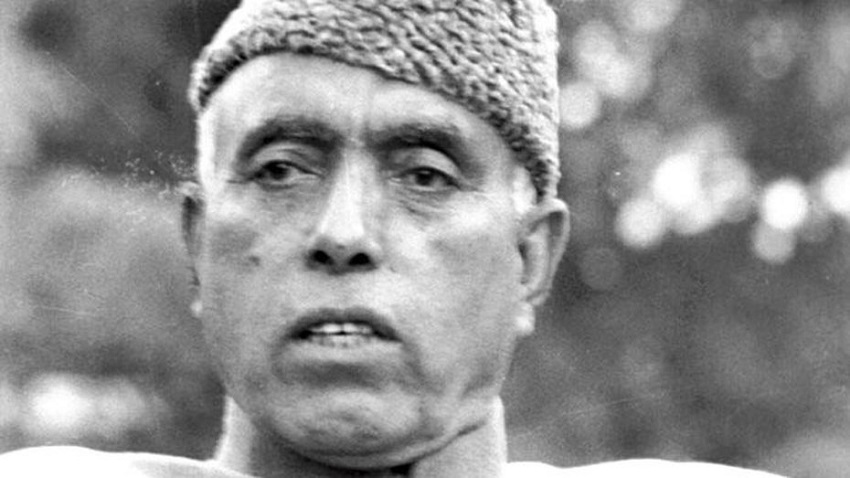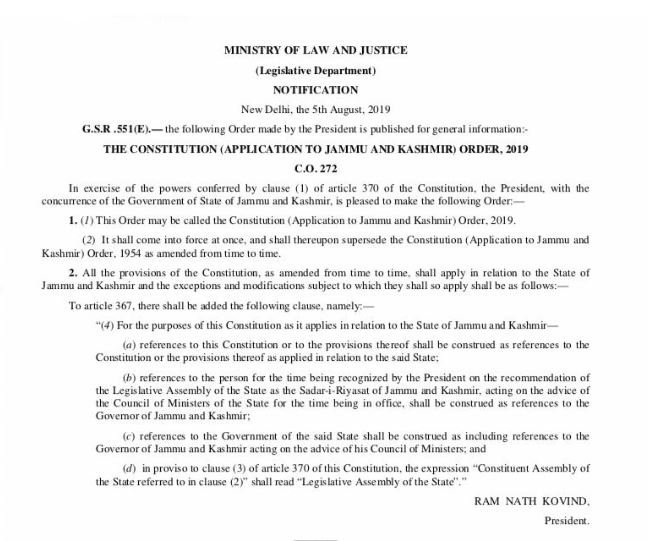
India is celebrating first anniversary of the revocation of Article 370 of the Constitution on August 5, which had proved hurtful not only to the people of Jammu and Kashmir but to the entire nation as well. Its revocation together with the reorganization of the state into two union territories was a historic event long awaited by the people who put great value to the territorial integrity and national sovereignty of the country.
For a long time, endless debates were conducted by the erudite in the civil society and political punditry not really on the jurisprudence of granting a measure of autonomy to a federating unit but essentially on the blatant misuse of the concession ultimately resulting in the disadvantage of society.
Our left-oriented political leadership had borrowed the idea of Article 370 from the Constitution of the Central Asian Republic of Uzbekistan drawn after the success of the Bolshevik revolution of 1917. Without being conversant with the history, society, culture and the life style of the Uzbek people and the real contours of the Bolshevik revolution, the Indian Left thrust Naya Kashmir manifesto as the roadmap for National Conference. It was almost a carbon copy of the Uzbek constitution.
With tremendous capacity of self – delusion, the Indian Left and its Kashmir chapter began to believe that the new era was going to dawn upon Kashmir under a popular administration. Looking in retrospect, one wonders on the poverty of their perception. They little understand that while the Bolshevik movement emanated from the factories and farms in Uzbekistan, the anti-Dogra rule movement in Kashmir emanated from the mosques and the Islamic seminaries (madrasahs) While the mosques in Uzbekistan were turned into coffee houses in which debates on the pros and cons of the revolution and the advent of modernism were rampant, the mosques in Kashmir became the nurseries for the spread of the pestilence of communalism and regionalism.
Nehru had placed one Dr. Ashraf from Rajasthan as in-charge of the Muslim minority cell in the Congress. A dedicated socialist, Anand Bhavan became Ashraf’s work place where he also looked after the personal library of Nehru. Kashmir was conspicuously under the observation of Nehru who told Dr Ashraf to look for Kashmiri students in Allahabad University who could be trained in progressive ideology for performing a useful role in the politics of Jammu and Kashmir. Dr. Ashraf patronized two promising Kashmiri students at the Allahabad University at that time. One was Niranjannath Raina, who later on became Professor and Head of the Department of Physics in Kashmir University, and the other was Dwarkanath Kachroo, who later on became the personal secretary of Nehru. He died in an air crash over the South Kashmir Mountains in early 1949.
After completing his studies at Allahabad, Dr. Raina joined the National Conference (NC) and became the central figure for introducing leftist ideology to the National Conference so much so that he succeeded in creating a strong Leftist wing in the NC led by G.M. Sadiq, who later on rose to become the Chief Minister of J&K. This writer happened to be a junior colleague of Dr Raina at the University of Kashmir. In a private meeting he disclosed to me that at Allahabad, Dr Ashraf wanted him to be Nehru’s personal secretary but he declined the offer. I asked Dr Raina the reason for missing a great opportunity. I will never forget his answer because it revealed to me the quintessential truth about Nehru. Dr Raina said he did not accept to be Nehru’s private secretary because “he (Nehru) is a half-baked socialist.” In fairness to late Dr Raina, the complicated issues facing us in India today including Kashmir are to a large extent the legacy of a “half-baked socialist ideology.”
After assuming unaccountable power as the “Prime Minister of J&K” in November 1947, the Sheikh hastily implemented the land reforms, the first item on the reform list of Naya Kashmir Manifesto. Having done that the Sheikh put the entire manifesto in cold store. Another significant thing which he did was to sideline the Left, which he had deftly exploited during the peak days of his anti-Dogra rule movement.

In May 1946, the Sheikh was imprisoned because he was leading the Quit Kashmir movement against the regime. Nehru decided to plead his case in the court of law at Srinagar. First, let us briefly analyze the wisdom of Nehru’s decision. How could he compare Quit Kashmir of Sheikh Abdullah with the Quit India movement of Gandhi when the latter was directed against an alien, a non-Indian colonial power and the former was neither a colonial power nor an alien? In the Conference of Indian Princely States in London, Maharaja Hari Singh had publicly stated that he was first a patriotic Indian and second a subject of the British Empire. The Maharaja had earnestly pleaded with Lord Mountbatten, the Governor General and Sardar Patel the Home Minister to dissuade Nehru from coming to Kashmir as that would impede his efforts of resolving the Kashmir tangle and freeing Sheikh Abdullah from the jail. Even Mountbatten had entreated Nehru to cancel his Kashmir visit. Nehru did not listen. He never came out of the psychosis of vendetta. The British put Nehru behind bars for a total of about 17 years during the freedom struggle. At the end of the day, Nehru strongly pleaded to make the very British symbol of royalty as the first Governor General of India. On the other hand, Nehru was detained under orders of the Maharaja for just one hour at Kohala, and in revenge he removed the Maharaja and handed over the State of Jammu and Kashmir to a Kashmiri leader who would thunder in public rallies and religious congregations that Muslim of the state were not going to accept the authority of a Hindu Maharaja.
The Constitution of free India was in the making in 1949. Sheikh Abdullah along with his law minister Afzal Baig encamped at 5 Prithvi Raj Road New Delhi for more than a month to force the Constituent Assembly to provide special status for J&K in the Indian Constitution. G. Parthasarthy, Nehru’s Kashmir points-man and emissary, was running between the Janpath and Prithviraj Road, twice and sometimes thrice a day, to conduct negotiations with the Kashmir’s Prime Minister Sheikh Abdullah. No Cabinet member, no parliamentarian and not event the Law Minister was prepared to accept any clause in the constitution that stipulated special status for J&K. The Law Minister, whom the Sheikh met, listened patiently to him for a long time and then told him,” Sheikh Sahib, I am not going to create another Pakistan on Indian soil.” That was also what the Home Minster had told him. And even Prime Minister Nehru was not fully convinced that the Sheikh was making a prudent demand. As Parthasarthy told the Sheikh that Nehru, too, had reservations, the Sheikh burst into rage and told him, “Go and tell your PM that in case of not accepting our terms we withdraw accession of the State to the Indian Union.” This was a blatant example of blackmailing the Constituent Assembly and the Indian leadership. Where was the commonality of ideology of which Nehru had made a fetish?
After returning from the Commonwealth Conference in London, Nehru used his influence and power to get the special status for J&K accepted by the Parliament and thus Article 370 came into existence.
Dr Shyama Prasad Mukherjee, then MP vehemently opposed the bill. He did not accept “do pradhan, do vidhan aur do nishan”. Dr Ram Manohar Lohia, MP said it was tantamount to dividing India for the second time, and Maulana Hasrat Mohani, a staunch secular Urdu poet from Mohana stood up from his seat in the Constituent Assembly with his bag slinging from his shoulder, went up to Nehru, placed his bag before him on the table and said,” Yeh lijiye apna secularism aur ham chale is aiwan se” (take this symbol of your secularism and I leave the house). Hasrat Mohani never returned to the Constituent Assembly.
Why it was essential to revoke of Art 370?
At the end of the day, the Sheikh, catapulted to power, began functioning in much more arbitrary manner. Maharaja Hari Singh wrote to the Sardar Patel how the populist leader was misusing his powers and authority and was functioning along communal and parochial lines. All this correspondence is to be found in V.P Menon’s biography of the Sardar Patel.
Sheikh Abdullah decided to call a Constituent Assembly to frame the draft of the state constitution. Out of 75 assembly seats, 74 were grabbed by National Conference (NC) and one seat went to an independent candidate in Jammu who was later on coerced into joining NC. Thus a Constituent Assembly of 75 members without a single member in opposition sat and debated and drafted the Constitution of Jammu and Kashmir, a region entirely diverse in geographical, religious, cultural, linguistic and ethnic terms. No logic will admit that justice could have been done to the peoples of the State.
The Indian Parliament had no powers to question many controversial clauses of the newly framed J&K Constitution. For example, the J&K Constitution did not recognize any group in the State as a minority group that needed special care and protection. But at the same time the Constitution hailed the Indian Constitution recognizing Muslims of India as the largest religious minority in the country and prioritized for offering it various favours and privileges. To further strengthen the communal complexion of the J&K Constitution, the State Assembly passed the reservation legislation for safeguarding political, economic and social interests of specific communities as backward classes. The Hindus and Sikhs were excluded from that category. When the Kashmiri Pandits pleaded their case at the UN Human Rights Commission to define their status, the Working Group on Minorities added one more definition to the existing definitions of Minority. It was like this: “A group could be a minority on regional basis but a majority on national basis and such groups are to be defined “Reverse Minority” as Kashmiri Pandits.
Proposing political governance for a State comprising three regions completely diverse from one another in all respects has been at the root of most of the problems in J&K. Since democracy means the game of numbers, it gives fair chance to the ruling majority party to bulldoze the interests of smaller groups especially when these are not constitutionally recognized minorities. Kashmir region with 45 seats had an edge over Jammu with 37 seats and this remained lasting friction between the two regions. The long-standing complaint of Jammu of Gerrymandering of electoral constituencies was never redressed.
Special status given to J&K in the Indian Constitution was stretched much beyond the expected limits. The State had enjoyed the right of having its own constitution. While the State constitution did not recognize any religious, ethnic, linguistic or cultural minority in J&K it, at the same time, was very favourably disposed towards the Indian Constitution considering Muslims of India as the largest national minority besides other three of them. In this way, the Muslims of Kashmir enjoyed the privilege of majority status in the State and minority status on national level. J&K Minorities held Article 370 responsible for their deprivation.

Article 370 was very harsh rather inhuman towards two categories of people, (a) the J&K residents of the PoK who were forced to flee their homes owing to the tribal invasion of 1947, and (b) those Hindu and Sikh residents of the adjoining region of Punjab who, in seeking a shelter to save their lives strayed into the Jammu area and were forced by circumstances to stay on. The State subject law was very rigidly enforced for category (a) above, so much so that many of them were unable to produce a proof of having migrated from PoK. They were discriminated against and denied all rights and privileges. Their children were denied admission in schools and professional institutions, scholarship and jobs. Their long suffering and violation of their human rights was a dark spot for the State administration. Majoritarian tyranny in the Assembly became the source of oppressing them.
In contrast, the PDP government admitted in the Assembly that a few thousand Rohingya Muslims were given shelter in Jammu. This was an understatement. No fewer than 89 thousand Rohingya Muslims from Myanmar were provided all facilities of settlement in the districts of Jammu and Samba like ration cards, Aadhaar cards, electric and water connection and many more facilities to make them almost at par with the permanent residents of the State. One may ask who violated the spirit of the State Subject law and the Article 370. It is the State government, the State Legislative Assembly with a majority of members from the valley. Moreover, nobody asks the questions why these Rohingya Muslims were settled in Jammu region and in Hindu dominated areas and on the critical LoC from where Pakistani infiltrates make repealed attempts of infiltration. This shows how blatantly the majority dominated government and the assembly were functioning in brazen communal manner.
In newly framed legislation, the State Assembly had passed a resolution depriving a state subject female marrying a spouse who is a non-state subject from statehood. Their offspring were denied right to state citizenship and could not raise any property in the State. This was tantamount to gender discrimination against which a world-wide campaign has been launched by the UN Human Rights Council.
The State government generally soft paddled with the centrally sponsored development plans and packages. Firstly it showed no serious interest in implementing those plans usually financed by the centre to the extent of 80%, and then if it did implement any of those, it never submitted a utilization certificate which is mandatory. The things had come to such a pass that many central ministries had to stop release of further installments of payment for the centrally sponsored packages owing to non-submission of utilization certificates.
The state government created many hurdles in the way of promoting industries in the State if industrialists from outside wanted to undertake an enterprise. Land would not be granted on lease, bank loans would not be extended, they were told not to induct manpower from outside the state despite the fact that skilled labour was scanty and non available in the State. Some of the centrally supported industrial units were turned into dens of disgusting politics where production was not a priority.
It was observed that the State legislative assembly did not show much interest in extending to the state many important laws passed by the Indian parliament and aimed at improving the rights and privileges of the people of the State. For example, the State government raised superficial questions in regards to the Right of Children to Free and Compulsory Education Act or Right to Education Act of the Parliament. Similarly, the State government has not been zealous about the Right to Information Act and did not provide institutional support it needed in the State.
Thus, we see that the State of J&K was deliberately putting off most of the developmental efforts of the Government of India aimed at boosting the development of the State and increasing the living standard of her people.
On August 4, 2019 a day ahead of the tabling of Reorganization Bill in the Parliament by the Home Minister, all political mainstream and other parties or groups in the valley met at the residence of Farooq Abdullah at Gupkar Road and passed a unanimous resolution now called Gupkar Declaration. It said that if the Government of India revoked Article 370 and tampered with the special status of J&K, it will be considered that India is at war with the people of Jammu and Kashmir. This was nothing short of sedition as it indirectly meant that the people of Kashmir (Jammu is not mentioned) would launch a war against the Government of India. The question is this: Has not Kashmir separatists and secessionists, under the support from outside as well as inside elements, launched an armed insurgency against India way back in 1989? Have not the sponsored insurgents in Kashmir brought about the ethnic cleansing of Kashmir Valley? Are not they fighting Indian security forces for last three decades day in and day out? What else is declaring war against India? Naturally, India is fighting the insurgency as well as moving forward with developmental programmes in J&K.
Article 370 and special status for the State both were against the larger interests of the people of the State. They have heaved a sigh of relief because for last seven decades they had seen only corruption, nepotism, blackmail and unemployment under the dynastic rule. Revocation of Article 370, transformation of the state into two union territories, and initiation of delimitation of constituencies and other reformative programmes have opened a new chapter in the modern history of Jammu and Kashmir. Only those whose vested interests have been struck down are vociferously demanding restoration of statehood and the assembly. They are simply horrified to see power slipping out of their hands just because they misused it. The people of the State welcomed the State Reorganization Act of 2019 which is evident from the fact that not a single demonstration was brought out by the people on such a sensitive issue. J&K, as Union territory is set for great development and prosperity in years to come.
